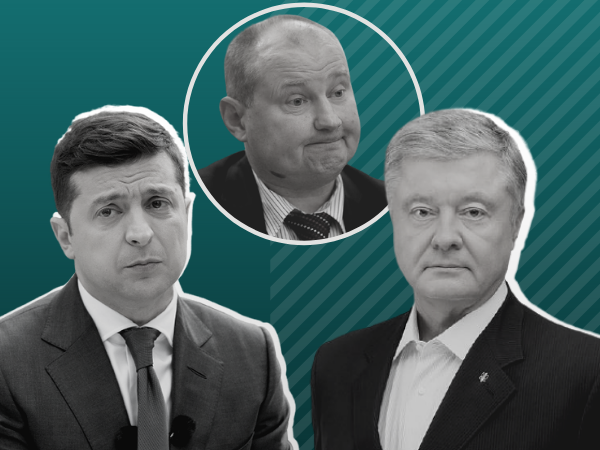
Moldovan media published a report of a parliamentary commission investigating the circumstances of the abduction. The conclusions of Moldovan MPs are extremely disappointing for Ukraine.
The detailed background of Mykola Chaus kidnapping in Chisinau in April this year, as well as the role of the Office of President Zelensky in this case can be traced in previous publications.
Moldova’s parliamentary commission has finished its work and published the results of the investigation. These results may be a threat for Ukraine.
First, the commission stated the involvement of Ukrainian citizens in kidnapping as an indisputable fact. It could be enough for Ukraine to take the most active part in the investigation of the incident in which both the victim and the kidnappers had Ukrainian citizenship. However, in practice, it turned out that the situation was quite opposite. Ukraine avoided participation in the investigation in every possible way.
Second, Moldova sees Chaus case as an element of Zelensky’s personal interest in prosecuting Petro Poroshenko. Apparently, Chaus was expected to give some evidence or statements, which would help to implement the numerous attempts to bring another accusation against Poroshenko. However, these attempts apparently failed. Chaus’s wife and lawyers consider the recent Telegram video of Chaus as further evidence of his forcible captivity, rather than as an intention to witness against Poroshenko.
Third, the conclusions of the parliamentary commission show that the version of the involvement of the Ukrainian secret services in Chaus kidnapping is currently prevalent.
Moldovan police detained two people involved in the kidnapping. These people confirmed the participation of the Ukrainian secret services. Moreover, the commission focuses on a number of factors that indicate the direct interest of the Ukrainian authorities
First and foremost, it is about ignoring the appeals of Moldovan police and parliament, as well as about the sabotage of the investigation by the Ukrainian representatives. Neither the Office of the Prosecutor General nor the Verkhovna Rada responded to the requests of Moldovan investigators and the parliamentary commission. In addition, the representatives of Ukraine in the Moldovan-Ukrainian investigation group simply ignored its meetings.
The commission also indicates a significant role of the military attaché of the Embassy of Ukraine in Moldova Serhii Smetaniuk. The report directly states that Chaus was taken out of Moldova in the boot of a Toyota Rav4 car owned by the embassy and driven by Mr. Smetaniuk.
Ukraine denied all requests from Moldovan police to investigate the car and interrogate the military attaché, who later left Moldova with his family. The son of the military attaché was expelled from a school in Moldova at the request of his mother and did not finish the school year. However, the usual practice in such cases shows that diplomats’ children end the school year in the host country even if their parents’ term of office expires.
The report describes the episode when Serhii Smetaniuk was crossing the border. When Moldovan border guards stopped his car, he refused to go out, and soon a car with armed Ukrainian military (!) arrived at the checkpoint ‘to resolve the situation’.
As the commission declares, ‘We still do not know on whose initiative the military attaché acted (at his own or according to someone’s instructions), but, of course, we can say that he has all the support of the diplomatic mission and the Ukrainian government’.
It is unlikely that a military attaché would have taken Chaus in a car boot across the border on his own initiative, and that he had the authority to engage armed soldiers to ‘facilitate’ border crossing.
It is also unlikely that such an order was given to the military in any department on their own initiative and without a direct order from the highest authority.
The result of the investigation of the Moldovan parliamentary commission is as follows: according to the information received by the commission, the abduction of ex-judge Chaus was committed by an organized group of identified Ukrainian citizens. They entered the territory of the Republic of Moldova a few weeks before the kidnapping and left the country an hour after the departure of the former military attaché of Ukraine in a RAV4 car with diplomatic license plates. Chaus was in the boot of that car.
According to the law enforcement agencies, this operation involved employees of the Main Intelligence Directorate of the Ukrainian Army.
Based on the above, the commission recommended that the Moldovan Ministry of Foreign Affairs and European Integration consider the actions and inaction of the Ambassador Extraordinary and Plenipotentiary of Ukraine to the Republic of Moldova Mark Shevchenko and former military attaché Serhii Smetaniuk in violation of the 1961 Vienna Convention on Diplomatic Relations. The commission also advised to send a note of protest to Ukraine, as well as to convey the official position and raise awareness of the Council of Europe, European Parliament, OSCE and PACE.
This seems to be the first accusation of this level against Ukraine since 1991.
The report of the commission also blames the Moldovan secret services and President Maia Sandu. MPs call Chaus kidnapping an attack on Moldova’s national security and recommend dismissing the Head of Moldovan Security Service.
President Sandu is accused of ignoring the work of the commission and refusing to provide the materials needed to conduct the investigation. The commission’s conclusion confirms the assumption that President Zelensky’s Office and Maia Sandu’s administration were negotiating the extradition of Chaus. It also confirms the prediction that political opponents of the Moldovan president will make use of this case.
To conclude, Moldovan police are convinced and have evidence of the involvement of Ukrainian special services in Chaus kidnapping. They also know about the assistance of Ukrainian diplomats in his deportation from Moldova. Both the military sphere and international relations are the complete prerogative of the President of Ukraine, so it is obvious where the legitimate claims of the Moldovan government will be directed. The issue of Chaus remains unresolved, and any attempt to resolve it will inevitably lead to new crises. In addition, relations between Ukraine and Moldova have been seriously damaged. The Ukrainian authorities are trying to pretend that nothing wrong is happening…

 Creative director of ROA Patrick Stengbye talking about the shoes he chooses for running, what the brand will surprise us with in 2024 and President Zelensky’s style
Creative director of ROA Patrick Stengbye talking about the shoes he chooses for running, what the brand will surprise us with in 2024 and President Zelensky’s style 




